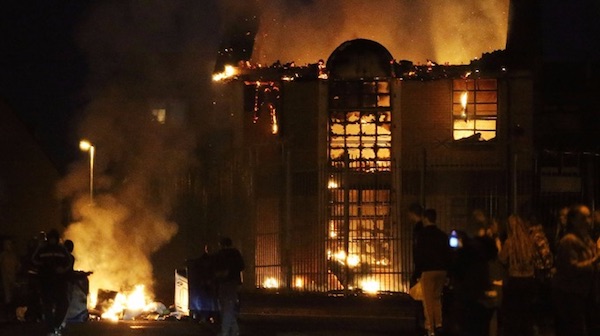
A one-sided approach by council authorities to bonfires has been blamed for a riotous conflagration in nationalist areas of Belfast city centre this week which threatened to reignite conflict at sectarian interfaces in the city.
Trouble began on Tuesday with the early-morning removal of bonfire material by Belfast city council in the nationalist Markets area of South Belfast.
Incensed teenagers who had gathered the material set fire to cars before the situation evolved into in open riot against the PSNI in the Markets area of south Belfast. Similar trouble in West Belfast saw youths torch a derelict building on the Lower Falls Road.
Nationalists have traditionally organised local bonfires to mark the anniversary of internment without trial in 1971, when scores were killed and hundreds locked up in an attempt to suppress resistance to British rule in the north of Ireland. In recent years, however, they have been widely condemned for their sectarian displays which can mirror those of the larger loyalist ‘Eleventh Night’ bonfires in July. Although in decline outside the most deprived areas, efforts by the political establishment to directly suppress the remainder have proved problematic.
This year, however, the openly actions of Belfast City Council proved catastrophically imbalanced. The council’s action stood in stark contrast to its support for loyalist bonfires, for which it has provided both financial and logistical aid.
In a dawn raid, private contractors hired by the council moved in to remove wood from the anti-internment bonfire site in the Markets. Crucially, the company had been hired prior to the July loyalist bonfires, but their services have only ever been used against nationalist ones, and loyalist bonfires continue to be unaffected.
Furious local youths quickly targeted expensive cars parked by professionals in the area, which is convenient for city centre office workers. A riot situation then developed as the PSNI moved in to protect vehicles parked in the Friendly Street and Stewart Street areas.
The PSNI later attempted to bring some office workers to their cars in the back of armoured vehicles, before being forced to drive away as rioting youths threw stones and bottles.
There was also rioting in West Belfast, where wood and other material were also removed from a bonfire site. Petrol bombs and stones were thrown in the Lower Falls amid a heavy police presence. In the most serious incident, an abandoned Credit Union buillding was set alight, and attempts were made to hijack buses/
As the trouble spread to the Short Strand in east Belfast, nationalist youths were involved in a standoff with loyalist youths from lower Newtownards Road. Trouble was also reported at the interface between Tigers Bay and the New Lodge and in the Blacks Road area of west Belfast.
COUNCILLORS ANGERED
Two cars were set alight in the New Lodge in north Belfast and petrol bombs were thrown at the PSNI, although a nationalist bonfire there ultimately went ahead after the wood-removal contractor refused to enter the area. Sinn Fein councillor JJ Magee said that the contractor pulled out “because of the trouble in the Markets”.
“The residents who live “cheek-by-jowl” with this bonfire had been “let down”, he said. “We’re very, very disappointed as a community,” Mr Magee said.
Although all sides agree that the communities affected have suffered discrimination and deprivation, the bonfire builders themselves have no obvious political support. Sinn Fein representatives strongly denounced the violence, describing those involved as “hoods” and “scumbags”.
The councillor for the Markets, Deirdre Hargey described the rioting there as “mindless vandalism”.
“Both commuters and residents have been affected,” she said.
“The community does not want this type of behaviour and it’s not representative of the people of this area,” she said.
Paul Maskey, Sinn Fein MP for West Belfast, condemned the violence in the Falls area as “wanton destruction by a number of young people causing havoc”.
Local SF city councillor Jim McVeigh insisted those involved were criminals and called for the PSNI to effect arrests, and for their their families to be evicted from their social housing.
“These people need to be dealt with by the police, brought before the courts and sent to jail for a long time,” he said.
“In fairness there have been police operations in the past, increased patrols, bail checks and that for maybe a few months, but what is needed here is a concentrated two year operation to tackle the small number of people who are making life hell for the vast majority trying to get on with their lives in Divis.
“Other working class areas, be they in nationalist or unionist areas, suffer from anti-social behaviour but Divis has the worst anti-social behaviour in the whole of the city. As well as the police doing their bit, the Housing Executive revoking people’s tenancies must be considered.
“There are young people, be they ten, 12, 16 or even 20, who are persistently involved in problems here and there’s parents who don’t care that their kids are roaming the streets ‘til all hours. Evictions have to be considered to tackle this.”
McVeigh hit back at those who had feared a backlash over a one-sided approach to bonfires.
“You need to stand up to these people and we knew it wouldn’t be easy, but we also knew that these bonfires are a curse on the communities they’re in. We’ve been consistent in our opposition to them and we will not roll over,” he said.
![[Irish Republican News]](https://republican-news.org/graphics/title_gifs/rn.gif)
![[Irish Republican News]](https://republican-news.org/graphics/title_gifs/harp.gif)

